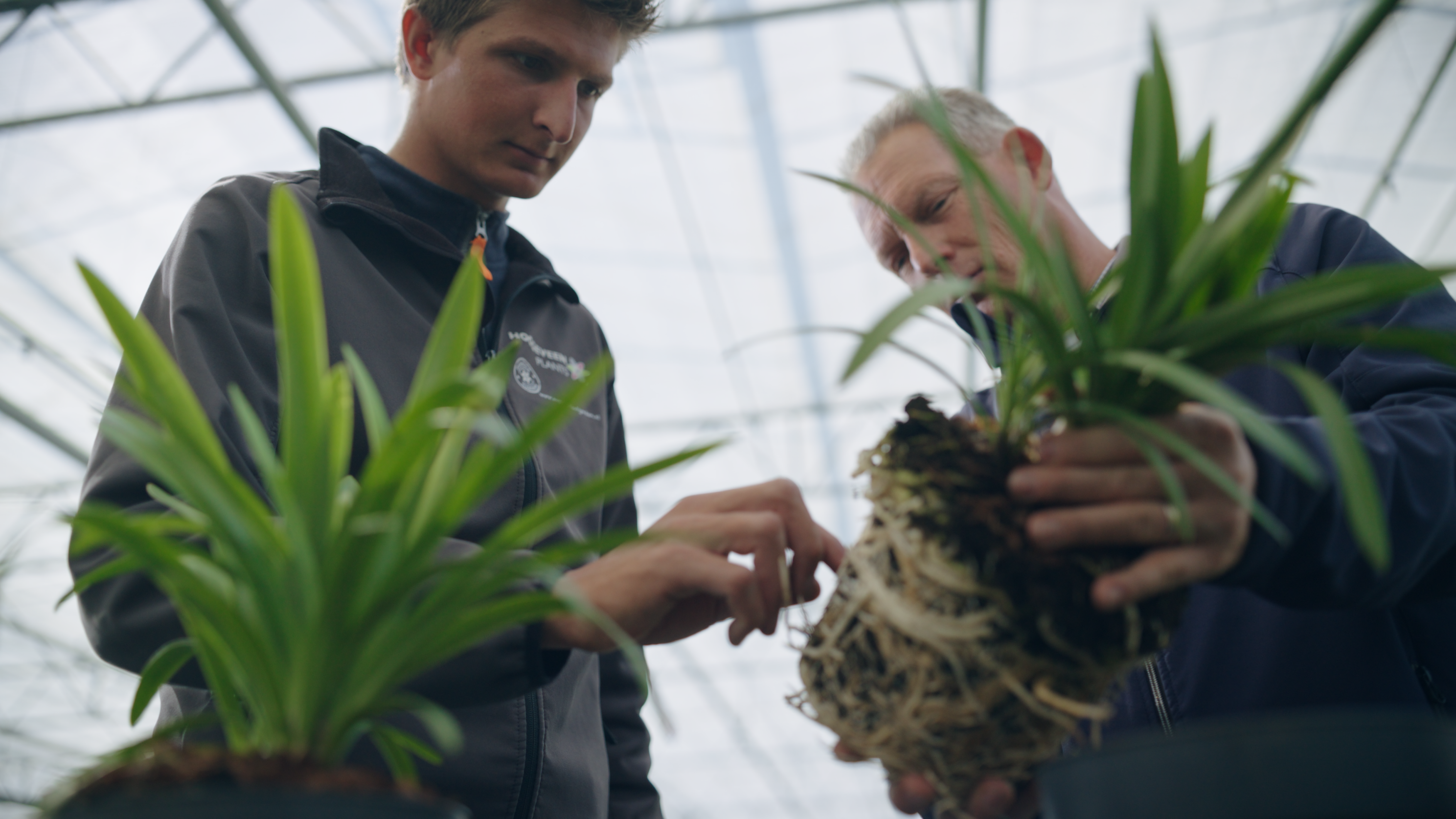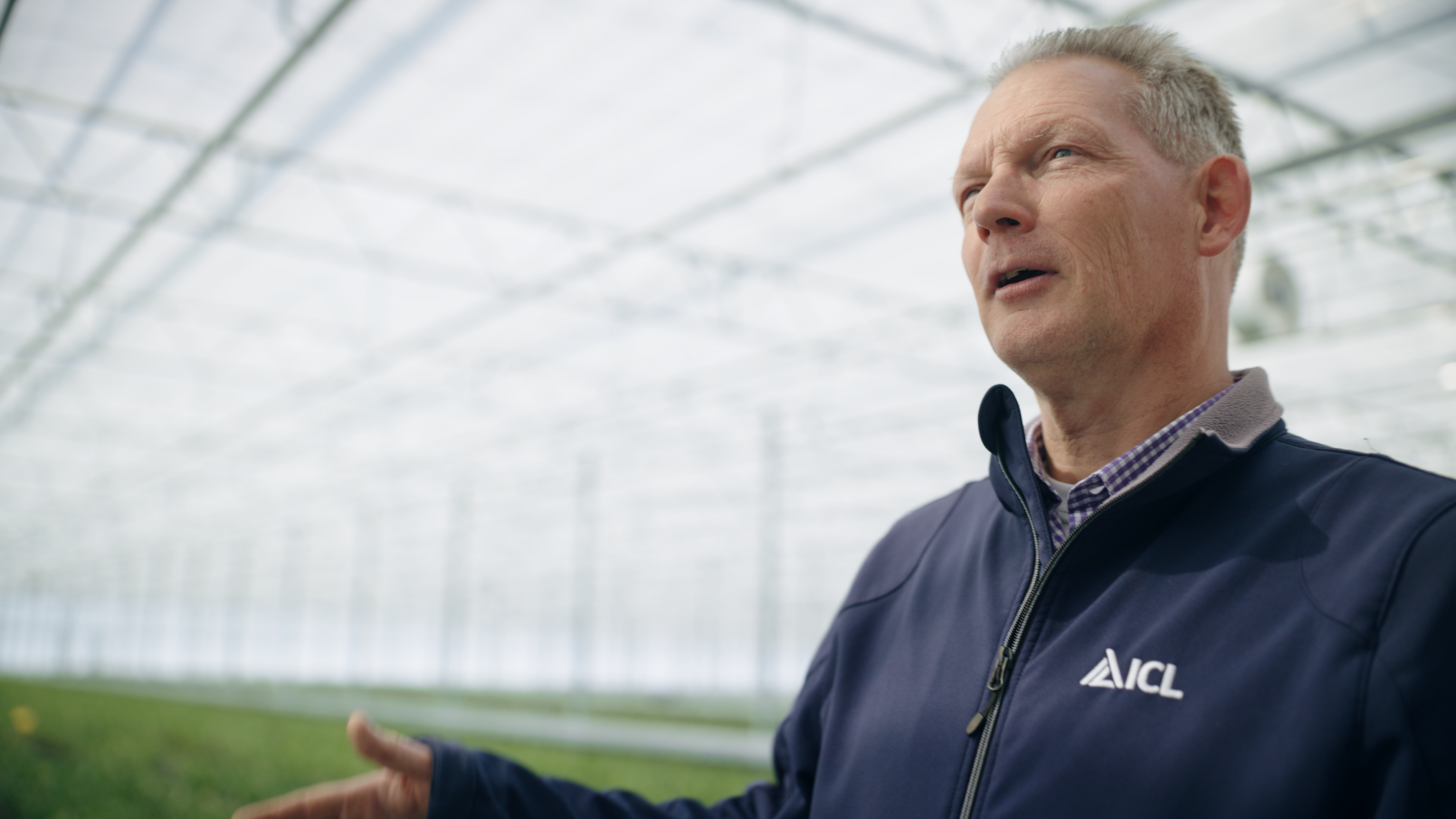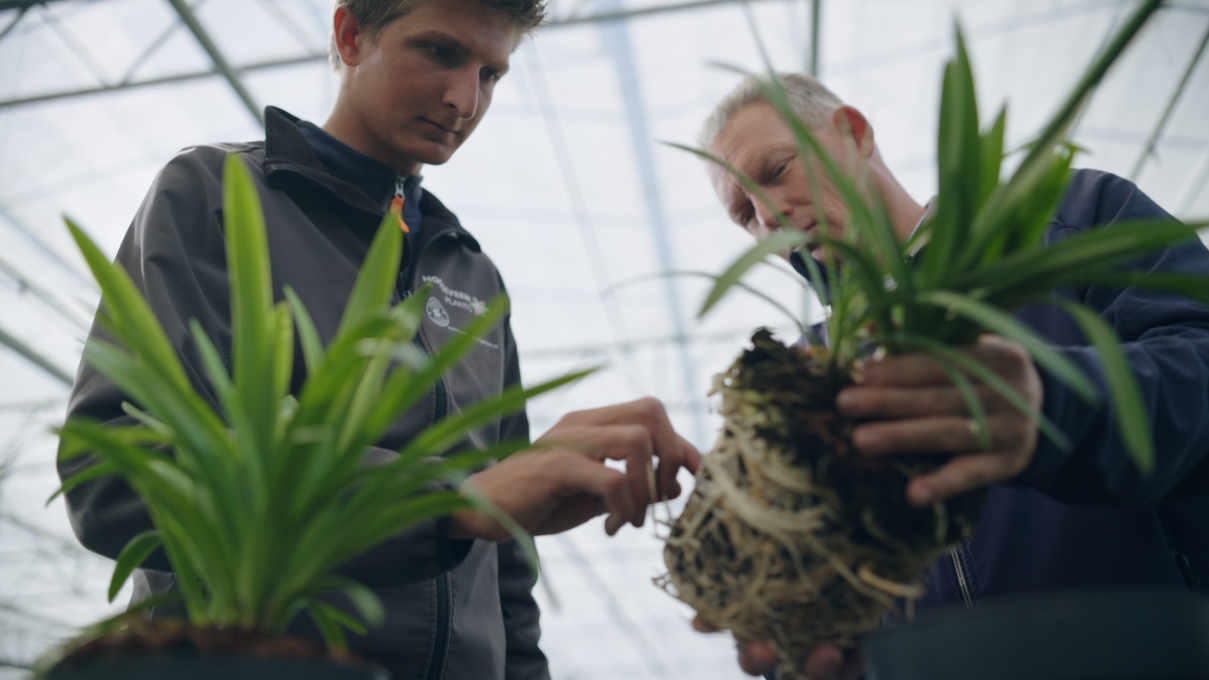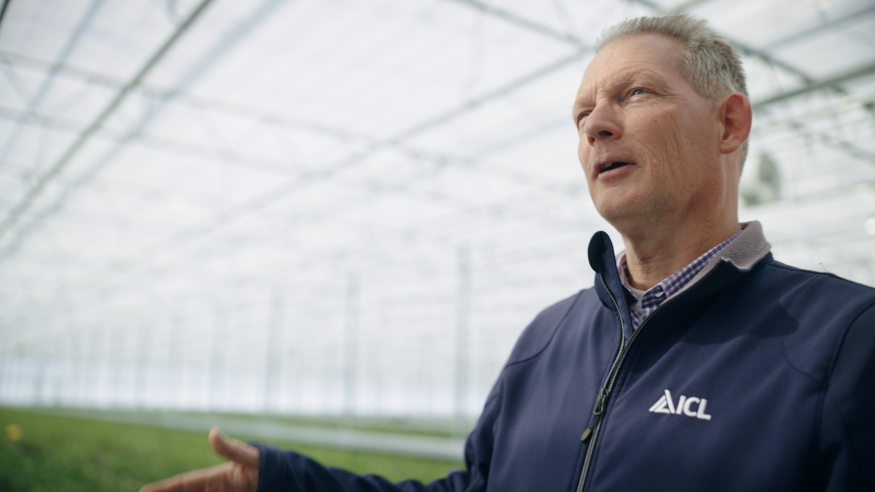
SCROLL DOWN
The efficient use of controlled-release fertilizers (CRFs) requires considerable knowledge on nutrients and trace elements, as well as understanding the growth cycles and nutritional needs of specific plant species. Only when applying the correct dosage of the right fertilizer, can it help grow the best possible plant.
That's why ICL's fertilizer experts are in daily contact with growers worldwide, looking for the best solutions for every ambition and cultivation challenge. They bridge the gap between fertilizers and growers’ demands, and help build the bridge to the perfect plant.
What Does a Grower Want?
The Key Question:
For growers, it’s crucial that the plants are uniform. Uniformity means less sorting work for the grower and a reduced volume of ‘second grade quality’ plants. What uniformity exactly is, is different for each grower. Mark explains: “It’s possible to cultivate many different end products from the same variety of plant. If the grower primarily wants compact plants, then the fertilizer approach can be adjusted to achieve that. For example, you can cultivate hydrangeas as beautiful, dense plants that produce lots of flowers, which are perfect for garden centers. But if the grower is selling their hydrangeas to a landscape gardener, the ideal plant is smaller and produces fewer flowers. If the grower is supplying its plants to a DIY store, they want as many plants as possible to fit on a trolley – they need their plants to be short and narrow. Big, dense, or compact. Many flowers or only a few: With the right fertilizer approach, we can help growers achieve the desired end product. That’s exactly where our expertise lies and how we can add value for growers.”
between Plant Nutrition and Growers
area sales manager
Mark explains: “The foundation for our success in this field starts with our colleagues in the lab and at the production site. We must be able to trust blindly that each granule is right—and we do!”
“Big, dense, or compact. Many flowers or only a few: With the right fertilizer approach, we can help growers achieve the desired end product. That’s exactly where our expertise lies and how we can add value for growers.”
Innovating in the Field
Diverse Customers Call for Diverse Ideas
Trust in High Quality Fertilizers
Mark started working for the company in 1998 as a Trial Coordinator. Luckily, he never lost interest in innovative approaches to fertilization, and he continues to actively look for ways to improve in his role as advisor. “I am involved in the trials at our official trial fields, such as at Hoogenraad in the Netherlands, but I also conduct lots of trials at customers. These trials include the comparison of products and what specific cultivation situation would work best. Currently, I’m conducting a trial at one of our growers with Osmocote Flower in an outdoor cultivation. We noticed that the crop was not performing as well as expected, so we carried out some trials to find out what fertilizer approach and dosage produced better results.”
Innovation is necessary to grow better plants, but changing regulations can also be the driving force for innovation. For example, a pot plant grower in the Netherlands was applying plant growth regulators to keep his plants compact, but had the wish for a more environmentally friendly approach. Mark searched for a solution together with the grower. “We are looking for new ways to cultivate plants, especially now. An example of this is the move towards the use of peat-reduced growing media. This has significant consequences on the fertilization. Alternatives such as wood and coconut fiber do not retain water and nutrients as efficiently. Hence, we are currently conducting many trials with these alternatives to discover what N dosage is needed to achieve the best results. These are practical trials that are conducted at the growers nurseries.”
Being in contact with customers is one of the most important aspects of Mark’s job as an advisor at ICL. Unlike most of his colleagues that specialize in a specific market, Mark has a wide range of customers in his portfolio, from pot plant, bedding plant, and cut flower growers, to tree nurseries. He also maintains good contact with dealers and producers of growing media. “If I discover something interesting at a pot plant nursery, it may also be applied at a tree nursery. In my role as an all-round advisor, I visit a wide variety of customers and see things that may work for other growers and cultivations too. In the past, it was mainly the cut flower and pot plant markets that showed significant innovation in comparison to for instance tree nurseries. But that gap is really gone now. Also in container cultivations, we see a lot more innovative initiatives and that’s a fantastic development.
Only after a thorough process of strict quality assurance standards and checks are ICL’s controlled-release fertilizers supplied to growers. For the production of these quality fertilizers, uniformity is also vital: if the quality of each fertilizer bag isn’t a 100% consistent, how can the uniform high quality of the cultivated plants be ensured? Mark explains: “Each bag of fertilizer is uniform, and that is visible every growing season in the consistent performance of our products. Our products really stand out in this matter and that’s why growers stay with us. The fertilizer products are 100% reliable. Over the years, we continued to innovate – the release patterns and availability of trace elements are better than ever – and this is also how we differentiate ourselves from our competitors.”
One of these ‘bridge builders’ is Mark van Dulmen. He is the Area Sales Manager at ICL for ornamental plant cultivation (tree nursery, perennial plants, outdoor cultivated cut flowers, bulbs), and visits Dutch growers on a daily basis. “I see some growers more often than others, and you really do build up a relationship with them over the years. On occasion, after leaving an appointment with a grower, I realize we’ve hardly spoken about the plants because everything is running smoothly. We can just chat about our vacations instead,” laughs Mark. The growers’ own needs determine how often Mark visits them. He explains: “It depends on the grower. Some companies employ their own fertilizer advisor, and in that situation my role is mainly supportive. But at other nurseries, I get much more involved in the fertilizer approach.”
Building Bridges


Being in contact with customers is one of the most important aspects of Mark’s job as an advisor at ICL. Unlike most of his colleagues that specialize in a specific market, Mark has a wide range of customers in his portfolio, from pot plant, bedding plant, and cut flower growers, to tree nurseries. He also maintains good contact with dealers and producers of growing media. “If I discover something interesting at a pot plant nursery, it may also be applied at a tree nursery. In my role as an all-round advisor, I visit a wide variety of customers and see things that may work for other growers and cultivations too. In the past, it was mainly the cut flower and pot plant markets that showed significant innovation in comparison to for instance tree nurseries. But that gap is really gone now. Also in container cultivations, we see a lot more innovative initiatives and that’s a fantastic development.
Diverse Customers Call for Diverse Ideas
Mark started working for the company in 1998 as a Trial Coordinator. Luckily, he never lost interest in innovative approaches to fertilization, and he continues to actively look for ways to improve in his role as advisor. “I am involved in the trials at our official trial fields, such as at Hoogenraad in the Netherlands, but I also conduct lots of trials at customers. These trials include the comparison of products and what specific cultivation situation would work best. Currently, I’m conducting a trial at one of our growers with Osmocote Flower in an outdoor cultivation. We noticed that the crop was not performing as well as expected, so we carried out some trials to find out what fertilizer approach and dosage produced better results.”
Innovation is necessary to grow better plants, but changing regulations can also be the driving force for innovation. For example, a pot plant grower in the Netherlands was applying plant growth regulators to keep his plants compact, but had the wish for a more environmentally friendly approach. Mark searched for a solution together with the grower. “We are looking for new ways to cultivate plants, especially now. An example of this is the move towards the use of peat-reduced growing media. This has significant consequences on the fertilization. Alternatives such as wood and coconut fiber do not retain water and nutrients as efficiently. Hence, we are currently conducting many trials with these alternatives to discover what N dosage is needed to achieve the best results. These are practical trials that are conducted at the growers nurseries.”
Innovating in the Field

Only after a thorough process of strict quality assurance standards and checks are ICL’s controlled-release fertilizers supplied to growers. For the production of these quality fertilizers, uniformity is also vital: if the quality of each fertilizer bag isn’t a 100% consistent, how can the uniform high quality of the cultivated plants be ensured? Mark explains: “Each bag of fertilizer is uniform, and that is visible every growing season in the consistent performance of our products. Our products really stand out in this matter and that’s why growers stay with us. The fertilizer products are 100% reliable. Over the years, we continued to innovate – the release patterns and availability of trace elements are better than ever – and this is also how we differentiate ourselves from our competitors.”
Trust in High Quality Fertilizers
For growers, it’s crucial that the plants are uniform. Uniformity means less sorting work for the grower and a reduced volume of ‘second grade quality’ plants. What uniformity exactly is, is different for each grower. Mark explains: “It’s possible to cultivate many different end products from the same variety of plant. If the grower primarily wants compact plants, then the fertilizer approach can be adjusted to achieve that. For example, you can cultivate hydrangeas as beautiful, dense plants that produce lots of flowers, which are perfect for garden centers. But if the grower is selling their hydrangeas to a landscape gardener, the ideal plant is smaller and produces fewer flowers. If the grower is supplying its plants to a DIY store, they want as many plants as possible to fit on a trolley – they need their plants to be short and narrow. Big, dense, or compact. Many flowers or only a few: With the right fertilizer approach, we can help growers achieve the desired end product. That’s exactly where our expertise lies and how we can add value for growers.”
What Does a Grower Want?
The Key Question:
One of these ‘bridge builders’ is Mark van Dulmen. He is the Area Sales Manager at ICL for ornamental plant cultivation (tree nursery, perennial plants, outdoor cultivated cut flowers, bulbs), and visits Dutch growers on a daily basis. “I see some growers more often than others, and you really do build up a relationship with them over the years. On occasion, after leaving an appointment with a grower, I realize we’ve hardly spoken about the plants because everything is running smoothly. We can just chat about our vacations instead,” laughs Mark. The growers’ own needs determine how often Mark visits them. He explains: “It depends on the grower. Some companies employ their own fertilizer advisor, and in that situation my role is mainly supportive. But at other nurseries, I get much more involved in the fertilizer approach.”

The efficient use of controlled-release fertilizers (CRFs) requires considerable knowledge on nutrients and trace elements, as well as understanding the growth cycles and nutritional needs of specific plant species. Only when applying the correct dosage of the right fertilizer, can it help grow the best possible plant.
That's why ICL's fertilizer experts are in daily contact with growers worldwide, looking for the best solutions for every ambition and cultivation challenge. They bridge the gap between fertilizers and growers’ demands, and help build the bridge to the perfect plant.
between Plant Nutrition and Growers
Building Bridges
area sales manager